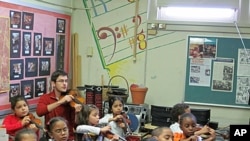How does a young classical musician, fresh out of school, navigate the tricky and somewhat limited career options available? Two of the most prestigious arts organizations in New York City have come up with an answer. Their program suggests talent alone isn’t enough - musicians must be teachers and entrepreneurs, too.
"How do we deliver, to the best young musicians, a skill set that will enable them to define their own lives as musicians, around what their own talent is? You know, rather than having to say, 'Aah, I’m going to have to apply for that job or I’m going to have to apply for that job, because that, I think is the box that will enable me to earn a living as a musician,'" says Carnegie Hall executive director Clive Gillinson. "We’re saying, you’ve actually got the capacity to define your own life."
The idea for The Academy began a few years ago over a meal. Gillinson and Juilliard School president Joseph Polisi were talking about the challenges young classical musicians face today. The two designed a program they hope will produce not only great musicians but also great communicators.
The Academy
Every two years, they select 20 fellows who each receive a stipend of $25,000 a year, health insurance, and access to the best teachers and coaches at Juilliard. They work three days a week, 30 weeks a year, on the very highest musical level - performing on one of Carnegie’s stages with artists like conductor Sir Simon Rattle - and on the most basic musical level - teaching in New York City public schools.
One of the fellows beginning the program is Nathan Schram, a genial 23-year-old viola player. He got a music degree at Indiana University in 2008, and received an e-mail last year inviting him to audition for the Academy.
"I was thrilled. It sounded great," says Schram. "It sounded like it was going to help me communicate better with audiences. I was going to find a newer audience. I was going to help people that might otherwise not be able to experience this music and maybe I could learn something from them, too. And now I’m here. Day One."
Off to school
Day One for Schram is in mid-October at P.S. 75, an elementary school in Bushwick, an immigrant and working class neighborhood in Brooklyn.
Zelman Bokser teaches violin there. "You know, I think you would describe this school as under-resourced and it’s not a very high socio-economic neighborhood."
But even with limited resources, Bokser has created a vibrant music program - in a school of 650 students, he’s teaching 83 of them to play the violin.
"What’s amazing is that these kids are competitive with kids in any other public school in the city, in this program. So, these kids have played in Carnegie Hall and at Lincoln Center, at the Apollo Theatre and lots of other places. And there are very few schools that have had those opportunities. So, we’re really lucky."
And Bokser says they’re really lucky now to have a professional musician in their midst. Bokser divides the class in half and has Schram help with tuning the violins and helping with musical exercises. As the class winds down, Schram brings out his viola, to demonstrate.
A month later, Schram is back. He’s hatched a plan to do some improvisations with Bokser.
"I’m trying to explain to them that music can also have character, music can describe people, it can be a character in itself. And just trying to develop on their understanding of music and what’s possible they can do with it."
Providing inspiration
So, the third and fourth grade beginning class decides Schram should improvise a piece that expresses who he is. When Schram and Bokser begin to play, fourth graders Julissa Guzman and Calista Conde are impressed.
"They just popped it up in their mind," say Julissa. "I don’t think they didn’t even rehearse for that."
And, Calista finds herself inspired. "When I am in fifth grade, I would like to play in Carnegie Hall and hear all the people clap, just for me."
Schram says working with the kids has been inspiring for him, too.
"You know, the kids are wonderful. I’m amazed at how well-behaved they are, how excited they are about music and, just, they’re very receptive; and if someone doesn’t get something the first time, they’ll get it the second. I mean, it’s just, you see, I didn’t expect to have such quick results."




